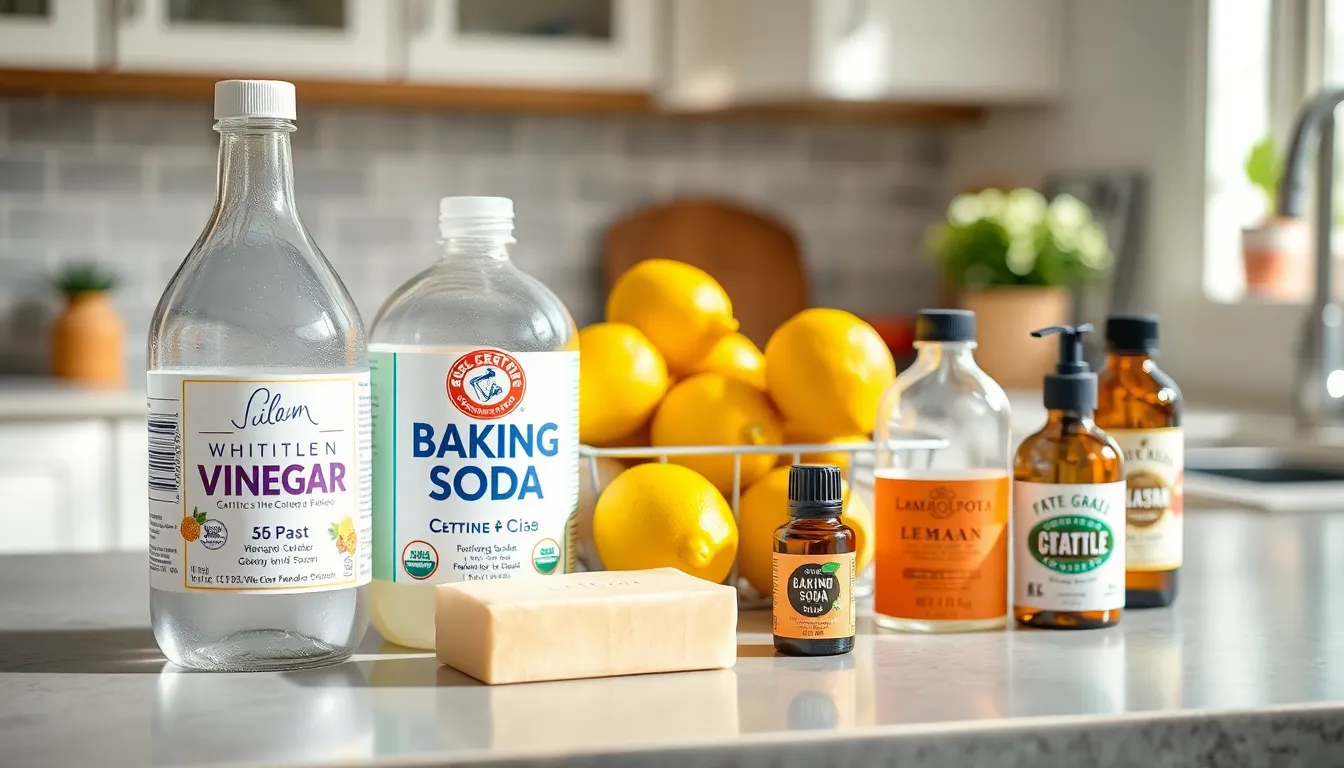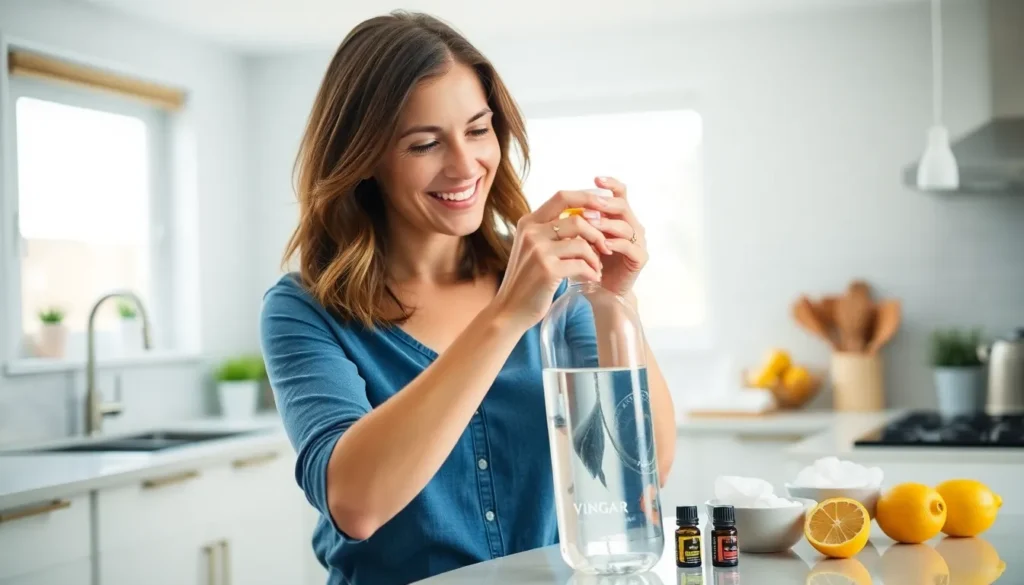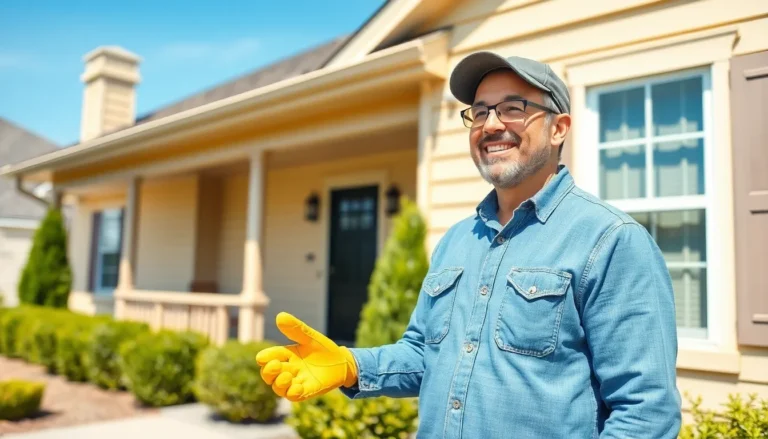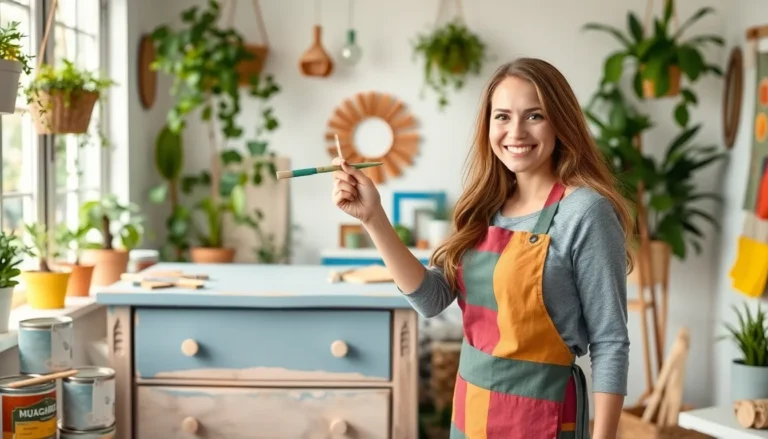In a world increasingly focused on sustainability and health, DIY cleaning products have become a popular choice for many households. These homemade solutions not only reduce exposure to harsh chemicals but also offer a cost-effective alternative to commercial cleaners. With just a few simple ingredients, anyone can whip up effective cleaning formulas that tackle dirt and grime without compromising safety.
Embracing DIY cleaning products empowers individuals to take control of their cleaning routines. It allows them to customize scents and strengths according to personal preferences while minimizing environmental impact. Whether it’s a refreshing all-purpose cleaner or a powerful stain remover, the benefits of going DIY are clear. Discovering the art of homemade cleaning can transform mundane chores into a rewarding experience.
Table of Contents
ToggleBenefits of DIY Cleaning Products
DIY cleaning products offer numerous advantages, notably in environmental sustainability and personal health. These homemade alternatives frequently promote safe living while ensuring cost savings.
Eco-Friendly Alternatives
DIY cleaning products frequently utilize natural ingredients, such as vinegar, baking soda, and essential oils. These substances reduce harmful chemical usage, aiding in environmental protection. Each ingredient individually contributes to a lower carbon footprint and minimizes air and water pollution. By choosing DIY recipes, individuals significantly decrease packaging waste associated with commercial cleaners, further supporting eco-friendly practices.
Cost-Effectiveness
DIY cleaning products often cost less than their commercial counterparts. Basic ingredients like vinegar and baking soda, available for a few dollars, provide multiple uses and cleaning solutions. Each homemade mixture can replace several expensive products, leading to overall savings. Crafting cleaning solutions at home allows for precise control over quantities and formulations, preventing unnecessary expenses and waste.
Essential Ingredients for DIY Cleaning Products

Creating DIY cleaning products involves using simple, effective ingredients that promote sustainability and health. The following sections detail common household items and natural essential oils suitable for crafting eco-friendly cleaning solutions.
Common Household Items
- White Vinegar: Acts as a natural disinfectant and deodorizer. It’s effective at breaking down grime and mineral deposits.
- Baking Soda: Functions as a gentle abrasive for scrubbing. It neutralizes odors and boosts the cleaning power of other ingredients.
- Lemon Juice: Contains citric acid, which has antibacterial properties. Its fresh scent and acidity make it ideal for cutting through grease.
- Castile Soap: A vegetable-based soap that cleans without harsh chemicals. It’s versatile for different surfaces, including floors and dishes.
- Hydrogen Peroxide: Serves as a mild antiseptic and can sanitize surfaces effectively. It helps remove stains and whiten laundry.
- Cornstarch: Can clean windows and polish furniture. It absorbs dirt and grease without scratching surfaces.
Natural Essential Oils
- Tea Tree Oil: Known for its strong antibacterial and antifungal properties. It effectively disinfects surfaces and adds a pleasant scent.
- Lavender Oil: Offers antimicrobial qualities and a soothing fragrance. It can enhance the cleaning experience and promote relaxation.
- Peppermint Oil: Provides a fresh aroma and acts as a natural pest repellent. It invigorates spaces while supporting cleanliness.
- Lemon Oil: Enhances the cleaning power of other agents. It leaves a refreshing scent while fighting bacteria and dirt.
- Eucalyptus Oil: Recognized for its antiseptic properties. It can aid in combating mold and bacteria, making it useful in various formulations.
- Orange Oil: Contains d-limonene, which acts as a powerful degreaser. It offers a citrus scent while helping to dissolve sticky residues.
Using these essential ingredients, individuals can create effective and eco-friendly cleaning products tailored to their needs.
Popular DIY Cleaning Product Recipes
Creating effective DIY cleaning products is simple and cost-efficient. Below are popular recipes for various cleaning tasks.
All-Purpose Cleaner
An all-purpose cleaner is versatile and effective for numerous surfaces. Combine 1 cup of white vinegar, 1 cup of water, and 10-15 drops of essential oils, such as lemon or tea tree oil, in a spray bottle. Shake well before use. This solution cleans countertops, tables, and appliances while eliminating odors.
Glass Cleaner
A homemade glass cleaner leaves windows and mirrors streak-free. Mix 1 cup of water with 1 cup of white vinegar and a few drops of dish soap in a spray bottle. Shake gently to combine. Spray the solution on glass surfaces and wipe with a microfiber cloth for a spotless finish.
Bathroom Scrub
A bathroom scrub effectively tackles grime and mildew. Combine 1 cup of baking soda with 1/4 cup of Castile soap and 1/4 cup of water in a bowl to form a paste. Apply the paste to tubs, sinks, and tiles using a scrub brush. Rinse thoroughly. This scrub will remove soap scum and leave surfaces sparkling clean.
Tips for Effective DIY Cleaning
Effective use of DIY cleaning products hinges on proper techniques and practices. Following these tips ensures better results and longer-lasting solutions.
Proper Dilution Ratios
Maintaining proper dilution ratios enhances the effectiveness of DIY cleaning products. Using the right proportions increases cleaning power while minimizing surface damage. Common mixtures include:
- All-purpose cleaner: Combine equal parts of white vinegar and water.
- Glass cleaner: Mix 1 cup of water with 1 cup of white vinegar and a few drops of dish soap.
- Bathroom scrub: Blend 1 cup of baking soda with 1/2 cup of Castile soap and water until a paste forms.
Always follow specific recipes to achieve optimal results. Test solutions on inconspicuous areas first to ensure compatibility with surfaces.
Storage and Shelf Life
Correct storage of DIY cleaning products extends their usability. Use airtight containers to prevent contamination and degradation. Label each container with the contents and creation date. General guidelines on shelf life include:
- Vinegar-based cleaners: Last for up to 6 months if stored properly.
- Baking soda mixtures: Remain effective for 3 to 6 months when kept in a cool, dry place.
- Essential oil blends: Maintain potency for 6 to 12 months, depending on storage conditions.
Regularly check stored products for any signs of spoilage or changes in appearance. Discard items that show separation or unusual odors.
Embracing DIY cleaning products not only promotes a healthier home but also contributes to a more sustainable lifestyle. By utilizing simple ingredients like vinegar and baking soda, individuals can create effective cleaning solutions that are both cost-efficient and environmentally friendly. This shift towards homemade cleaners empowers people to take control of their cleaning routines while reducing reliance on harsh chemicals.
With easy-to-follow recipes and tips for effective use, anyone can start crafting personalized cleaning products that suit their specific needs. The satisfaction of creating these solutions fosters a connection to the cleaning process, making chores more enjoyable. As more people discover the benefits of DIY cleaning, a cleaner and greener future becomes increasingly achievable.










